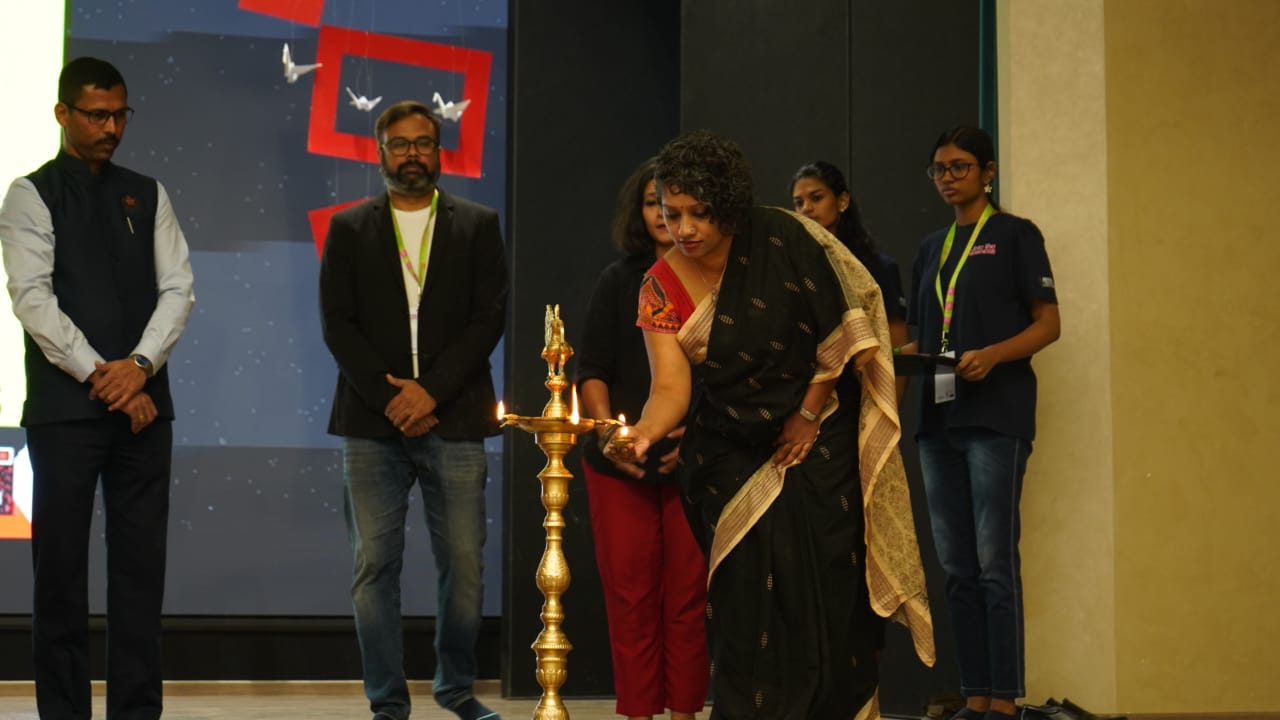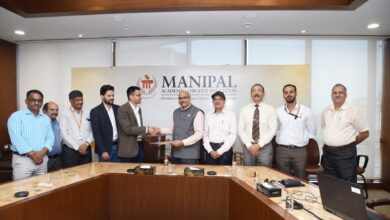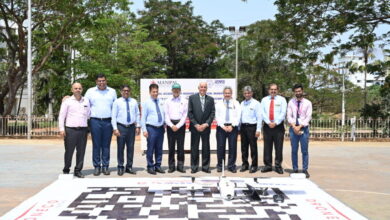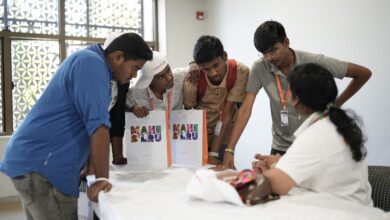Exploring New Ideas and New Frontiers at TEDx MAHE Bengaluru

Exploring New Ideas and New Frontiers at TEDx MAHE Bengaluru
Bengaluru, February 16, 2024: Manipal Academy of Higher Education Bengaluru hosted its first-ever TEDxMAHE Bengaluru event on 16th February which focused on social change. The event was centred on the theme “Into the Newness” and the day-long event featured talks by expert speakers who challenged conventional thinking and offered new perspectives on how social change can be community-centric and people-driven.
The event compromised of four thematic sessions. The first session titled ‘Provocations for Change’ presented talks questioning societal biases featured three speakers. It featured Shilpa Mudbi Kothakota, a performance artist, social activist and artistic researcher who questioned the complex relationships between folk music and cultural identity in her talk ‘Who Owns Folk Music?’. She said, “The distinctions between appreciating and appropriating folk music can frequently be hazy in today’s globally connected society. As a musician who is passionate in maintaining cultural legacy, I support approaching traditional music genres with awareness.” She further mentioned about her ‘Toolkit of Appreciation’ — Co-create, Contextualise, Credit, Compensate, which offers practical steps to honor and respect the rich tapestry of folk music traditions.
Poornima Seetharaman, Associate General Manager at Zynga, explored the potential of using games to foster positive social change through ‘Exploring New Societal Frontiers with Games’. She spoke about her journey with video games, busting the myth that games are merely a “waste of time” while also mentioning video games that she really loves, such as ‘That Dragon, Cancer’, ‘Gris’, and ‘Journey’.
The session concluded with Swathi Shyam Sunder, Head of the Applied AI Research and Development Group at Siemens Technology, who discussed the need to challenge one’s own biases in her talk titled ‘Break Your Biases’. Swathi Shyam Sunder extensively narrated her journey as a woman who pursued a career in the field of STEM, the imposter syndrome and feeling of being “too soft” she developed in male-dominated spaces and later overcame, and how she is determined to get to top positions despite women not being given promotions due to biases (as proven by studies).
The second session ‘Inking Inclusivity’ focused on marginalized communities. It featured Dr. Madegowda C., an Adivasi leader and post-doctoral researcher in ATREE, who discussed using indigenous knowledge systems for biodiversity conservation and empowering indigenous communities in his titled topic ‘Using Indigenous Knowledge for Biodiversity Conservation’. He added, “I think we need to understand the coexistence of indigenous communities, and in that way, we can contribute to conservation. The local community is very important for conservation, because they understand the forest”.
Further on, Summaiya Khan, Content Creator and Knowledge Management Officer, Karnataka Health Promotion Trust, said, “If we don’t talk about inclusion within, it is really superfluous to talk about inclusion outside of us. Inclusion is not just work for education, it is much more than that”. Summaiya presented ideas on ‘Into the Newness: Inclusion 360 Degree’ and discussed the need to foster inclusion of visually impaired through greater accessibility and opportunity creation for a more equitable society.
The last speaker of the session, Dr. Satyanarayana Ramanaik, lead for adolescent health programs at Karnataka Health Promotion Trust, advocated for community-centred design of public health programs to amplify voices and transform lives in this topic ‘Empowering Voices, Transforming Lives: Community-Led Solutions in Public Health Interventions’.
‘Exploring Healthscapes’ session had speakers deliberating innovations in healthcare. It featured speakers like Farah Ishtiaq, Principal Scientist at the Tata Institute for Genetics and Society, who spoke about ‘Does Sewage Hold the Secret to City’s Health?’ where she analysed how sewage can reveal vital public health insights on disease outbreaks in cities.
Vivek Mishra, Founder and CEO of Fibroheal Woundcare, focused on ‘Silk route to Woundcare’.
At last, Paras Sharma, co-founder and director of The Alternative Story, in his topic ‘Into the Newness: Navigating Mental Health in India’, examined systemic barriers towards mental healthcare access while also sharing promising solutions rooted in community-based interventions to address this critical issue. He added, “We need to be better allies and we need to part of the solution. We need to encourage more mental health conversations that is not part of psychology conventions”.
The closing session ‘Communities for Culture’ centred on cultural identity and preservation. The featured speakers like Ishita Shah, Designer, Historian and Curator at Curating for Culture, shed light on the topic ‘Community Engagement for Cultural Preservation’. The last speaker of the event Pasha Bhai, a Dakhni Rapper, examined using music as a tool for amplifying marginalised voices through ‘Untapped Potential of Dakhni Hip-Hop’.
The engaging mix of ideas and thought-provoking discussions at TEDxMAHE Bengaluru opened new avenues for debate around promising solutions to drive impactful social change. The talks set the stage for continuing the critical debates and conversations to motivate positive action towards building a more progressive, inclusive world.
About TED:
TED is on a mission to discover and spread ideas that spark imagination, embrace possibility and catalyze impact. Our organization is devoted to curiosity, reason, wonder and the pursuit of knowledge — without an agenda. We welcome people from every discipline and culture who seek a deeper understanding of the world and connection with others, and we invite everyone to engage with ideas and activate them in your community.
TED began in 1984 as a conference where Technology, Entertainment and Design converged, but today it spans a multitude of worldwide communities and initiatives exploring everything from science and business to education, arts and global issues. In addition to the hundreds of TED Talks curated from our annual conferences and published on TED.com, we produce original podcasts, short video series, animated educational lessons (TED-Ed) and TV programs that are translated into more than 100 languages and distributed via partnerships around the world.
Each year, more than 3,000 independently run TEDx events bring people together to share ideas and bridge divides in communities on every continent. Through the Audacious Project, TED has helped catalyze more than $3 billion in funding for projects that seek to make the world more beautiful, sustainable and just. In 2020, TED launched Countdown, an initiative to accelerate solutions to the climate crisis and mobilize a movement for a net-zero future. View a full list of TED’s many programs and initiatives.
TED is owned by a nonprofit, nonpartisan foundation. Our aim is to help create a future worth pursuing for all.
About TEDx:
In the spirit of ideas worth spreading, TEDx is a program of local, self-organized events that bring people together to share a TED-like experience. At a TEDx event, TED Talks video and live speakers combine to spark deep discussion and connection. These local, self-organized events are branded TEDx, where x = independently organized TED event. The TED Conference provides general guidance for the TEDx program, but individual TEDx events are self-organized (Subject to certain rules and regulations).
About Manipal Academy of Higher Education (MAHE):
Established in 1953, Manipal Academy of Higher Education (MAHE) is an Institution of Eminence and a Deemed to be University. With a remarkable track record in academics, state-of-the-art infrastructure, and significant contributions to research, MAHE has earned recognition and acclaim both nationally and internationally. In October 2020, the Ministry of Education, Government of India, honoured MAHE with the prestigious designation of Institution of Eminence Deemed to be University. Currently ranked sixth in the National Institutional Ranking Framework (NIRF), MAHE is the preferred choice for students seeking a transformative learning experience.
MAHE Bengaluru, an off-campus of MAHE, excels in delivering comprehensive education to students, supported by highly qualified faculty, and dedicated mentors. The MAHE Bengaluru campus has an inspiring, future relevant learning ecosystem, on a new age tech enabled living campus. Here, the students immerse themselves, transform and discover multiple choices and opportunities. At MAHE Bengaluru, the potential for growth and the opportunities available are boundless.





